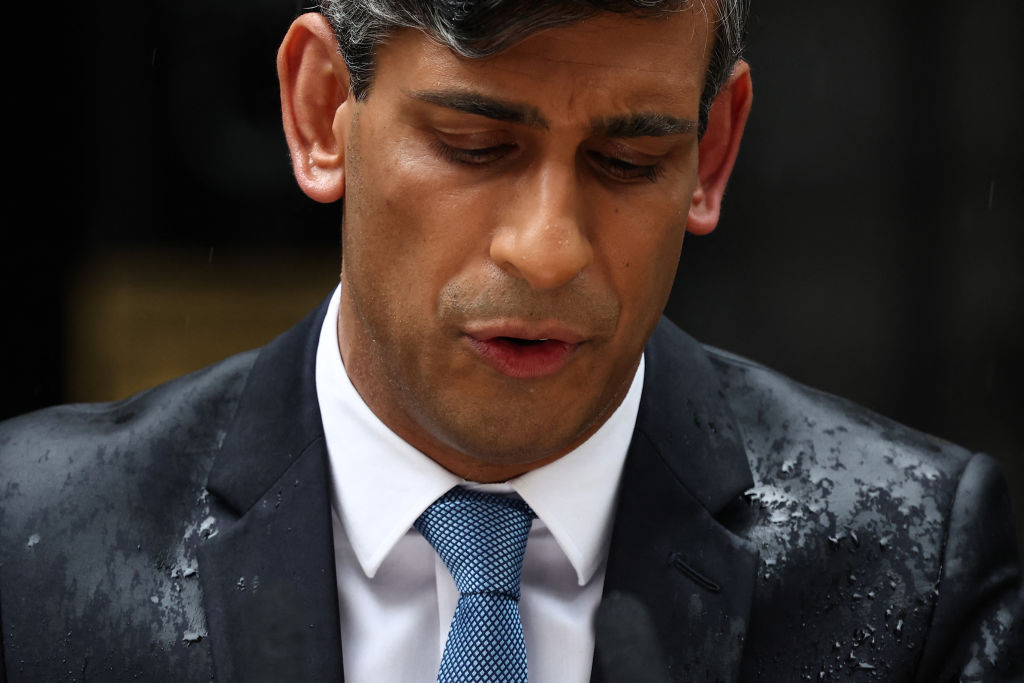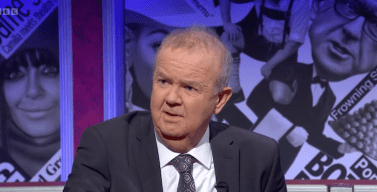Let’s be fair. It wasn’t Rishi Sunak’s fault it was raining. But it was, a bit, his fault that as someone who has ‘never been prouder to be British’, and so is presumably familiar with the way weather works in this country, he didn’t take one look at the lead-grey sky and make a contingency plan. That contingency plan could have been waiting 24 hours. It could have been delivering his speech indoors. It could have been – I don’t know – getting someone to stand a few feet away with a brolly, just in case.
As an incumbent Prime Minister setting out your stall for re-election, you don’t want to provide your audience with an insistent visual metaphor for the way that you’re humiliated by things beyond your control (or, as a predecessor characterised them, ‘events, dear boy, events’). Even if you’re not in control, you want to look in control. You want to look confident, masterful. You want to look, even, lucky. This is what scholars of rhetoric call the ethos appeal: the image you project to your audience.
You don’t, certainly, want to stand like a glum school prefect on a rained-out speech day with rainwater glistening like snail-trails on the lapels of your suit. You don’t want to have your would-be swelling oratory drowned out by some two-bit comedian playing ‘Things Can Only Get Better’ on a boombox just out of shot. You don’t want the feeling that surges in the nation’s breast to be a maternal desire to put your wet clothes on the radiator and sit you by the fire with a nice cup of tea and a crumpet. You don’t want pity. But pity was the one positive emotion that voters will have felt as they watched Rishi Sunak, convincing nobody, announce his plan to win the next general election.
That the nobodies who were convinced by his speech included Sunak himself was plain in his delivery. Another tenet of oratory is that even if you’re bending the truth, you need to sound absolutely convinced by what you’re saying. You need, yourself, to believe it in that moment. It’s a skill Tony Blair had. Mr Sunak, which is perhaps a tribute if nothing else to his self-respect, does not.
He dutifully hit the standard notes that we expect to hear in the oratory of such occasions. We heard that ‘Now is the moment for Britain to choose its future’. When, in such a speech, is it ever not? We got the standard stuff about ‘milestones’, ‘achievements’, ‘foundations’, ‘bedrock’, ‘best country in the world’, ‘values’, ‘my promise to you’, ‘generation-defining moments’, ‘future hung in the balance’.
But the voice of address was indecisive. Sometimes, Rishi was selling himself as the great protector: ‘I have never, and will never, leave the people of this country to face the darkest of days alone.’ At others he was a single humble shoulder to the wheel, boasting that ‘when we work together, anything is possible’.
The people of this country: were they ‘we’ or ‘you’? Sometimes one thing, sometimes the other. The government: were they ‘we’ or ‘they’? Sometimes one thing, sometimes the other. Every political speech will vamp a bit with pronouns – the standard journey is from ‘me and you’ to ‘us’ – but it needs to feel deliberate and directed rather than listless and accidental.
Where was the music? The Churchillian note, when he spoke about Ukraine, was available to be struck. His predecessor but one tended to strike it well. Sunak fluffed that too. ‘War returned to Europe with Putin’s invasion of Ukraine’, he said – a promising enough beginning, with the personification of war hinting at the terrible gravity of the historical moment, the threat to liberty, the awful loss of life. But he continued: ‘sending your energy bills spiralling.’ That is pure bathos. Did Churchill, when he declared, ‘Silent, mournful, abandoned, broken, Czechoslovakia recedes into the darkness’, follow up with, ‘and have you seen the petrol prices at the Esso on the big roundabout?’ He did not.
And look at the flatness and disorganisation of this paragraph:
These uncertain times call for a clear plan and bold action to chart a course to a secure future. You must choose in this election: who has that plan? Who is prepared to take the bold action necessary to secure a better future for our country and our children? Now, I cannot and will not claim that we have got everything right. No government should. But I am proud of what we have achieved together: the bold actions we have taken, and I’m confident about what we can do in the future.
Sunak structured that section (as he sought to structure the entire speech, picking them up in the last line of his peroration) around two workaday near-cliches – ‘clear plan’ and ‘bold action’. They barely strike the ear at all. In the first sentence, they are buried amid similar woolly, off-the-peg phrases: ‘uncertain times’, ‘chart a course’, ‘secure future’,
The second sentence reprises ‘plan’; the third sentence reprises ‘bold action’. But the chance for any resonant parallelism, in sentence structure or in phrasing, is thrown away. ‘Clear plan’ has lost its qualifier to become ‘plan’ and, in terms of cadence, has become a limp addendum to the redundant: ‘You must choose in this election’. ‘Bold action’ is repeated, but it’s buried in the middle of a sentence inflated with further redundancy: ‘necessary to secure a better future for our country and our children.’ Then he digresses into an apologetic aside about the government’s spotty record: honest, but weak-sounding. Any on-the-ball speechwriter would have blue-pencilled it.
Finally, the sentence that should sum up the section, that should give a ring of completeness, opens with more flannel – ‘I am proud of what we have achieved together’ – and goes on to repeat ‘bold action’ in a way that sounds aimless rather than purposive. Where’s the ‘clear plan’? Missing in action. Instead, he ended by saying ‘I’m confident’ – sounding anything but – and dismounting on a third, still less forceful, use of the word ‘future’.
Some may think this sort of analysis seems too close-up. Listeners, you might object, won’t parse a speech that closely. I’d put it the other way: a well-wrought speech works on an audience without them noticing because they don’t parse it that closely. It’s like music, or poetry: great precision and artfulness is required to create something that just sounds right, that stirs the heart without you being able to say why. And a badly wrought, badly delivered speech like this one is going to be a washout whether it’s raining or not.
Watch Cindy Yu and Andrew Neil discuss the election announcement on The View from 22:








Comments
Join the debate for just £1 a month
Be part of the conversation with other Spectator readers by getting your first three months for £3.
UNLOCK ACCESS Just £1 a monthAlready a subscriber? Log in